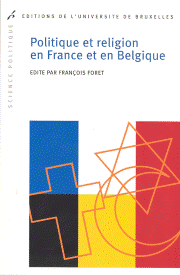 France and Belgium have been the two most persistent countries in refusing any reference to the Christian heritage of Europe in the European constitutional treaty. However, this common position has its origin in two quite distinct ‘laïcités’, each rooted in its own history and model defining the relations between politics and religion.France demands a unifying ‘laïcité’ relegating religion to the private sphere. Belgium is characterised by a pillar ‘laïcité’, which interacts and competes to define the dominant world view with religious denominations in the public sphere. Based on insights from various disciplines (political science, religious sociology, history, law, philosophy), a bi-national research team suggests that reality is more conciliatory than principles, but that this convergence does not restrain the resistance of cultural traditions. The erosion of different belief systems and the loss of influence of political and religious institutions alter the logics of the relation between the church and state, the partisan and social mobilisation, and the use of the sacred in society. In the context of European integration, religion nevertheless remains a strong symbolic stake and a resource in the redefinition of national identities and the ways of European co-existence.
France and Belgium have been the two most persistent countries in refusing any reference to the Christian heritage of Europe in the European constitutional treaty. However, this common position has its origin in two quite distinct ‘laïcités’, each rooted in its own history and model defining the relations between politics and religion.France demands a unifying ‘laïcité’ relegating religion to the private sphere. Belgium is characterised by a pillar ‘laïcité’, which interacts and competes to define the dominant world view with religious denominations in the public sphere. Based on insights from various disciplines (political science, religious sociology, history, law, philosophy), a bi-national research team suggests that reality is more conciliatory than principles, but that this convergence does not restrain the resistance of cultural traditions. The erosion of different belief systems and the loss of influence of political and religious institutions alter the logics of the relation between the church and state, the partisan and social mobilisation, and the use of the sacred in society. In the context of European integration, religion nevertheless remains a strong symbolic stake and a resource in the redefinition of national identities and the ways of European co-existence.
Presentation of the book in French:
La France et la Belgique ont été les deux pays les plus acharnés à refuser toute référence à l’héritage chrétien de l’Europe dans le traité constitutionnel européen. Cette position commune renvoie pourtant à deux laïcités bien distinctes, chacune enracinée dans son histoire et son modèle de relations entre politique et religion. La France revendique une laïcité englobante reléguant le religieux dans l’espace privé. La Belgique est caractérisée par une laïcité-pilier, en interaction et concurrence avec les visions du monde confessionnelles dans l’espace public. A partir d’éclairages disciplinaires variés (science politique, sociologie des religions, histoire, droit, philosophie), une équipe binationale de chercheurs suggère que la réalité est plus accommodante que les principes, mais que les convergences n’occultent pas la résistance des traditions culturelles. L’érosion des systèmes de croyances et la perte d’emprise des institutions modifient les logiques des rapports entre Eglises et Etat, les mobilisations partisanes et sociales et les usages du sacré en société. Le religieux n’en demeure pas moins un enjeu symbolique fort et une ressource dans la redéfinition des identités nationales et des modalités du vivre-ensemble à l’œuvre dans le contexte de l’intégration européenne.
Full info:
Politique et religion en France et en Belgique
François Foret (ed.) Editions de l’Université de Bruxelles, 2009 (in French)